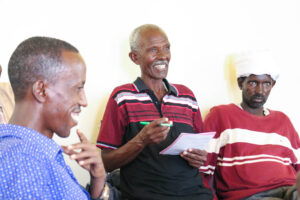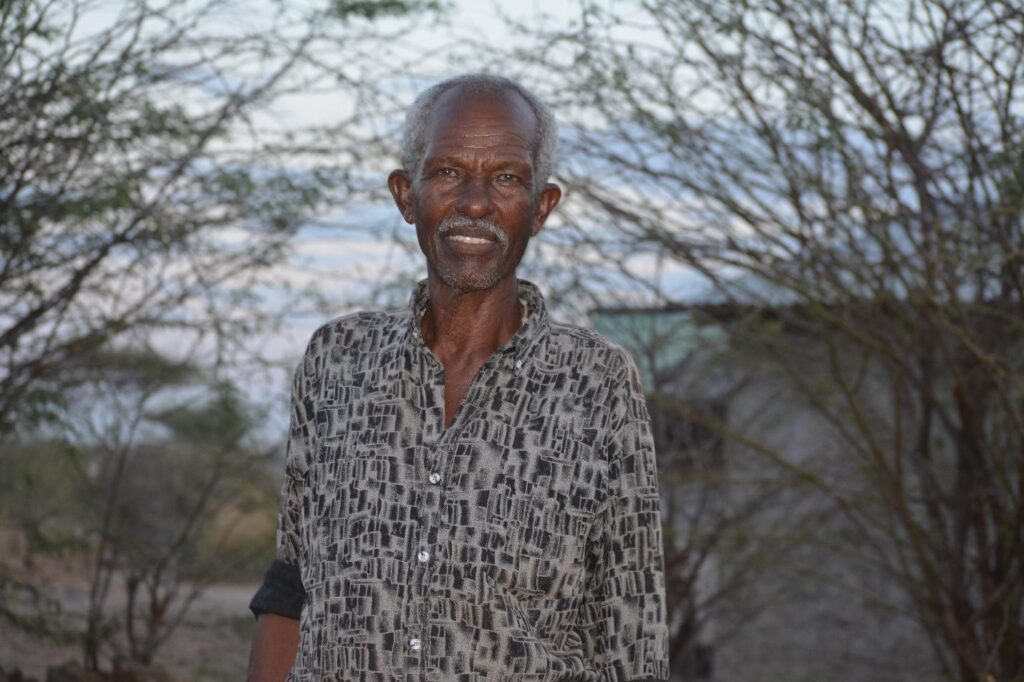A Life of Endurance and Adaptation
BLOG
Introduction

George Galgalo in a Livestock market meeting
Dukana, a remote village along the Ethiopia-Kenya border, is home to a resilient community of pastoralists who depend heavily on livestock for their livelihoods. The Dukana Livestock Market Association, chaired by George, has played a significant role in revitalizing the local economy by promoting the commercialization of livestock markets. However, the community faces numerous challenges, including recurrent droughts, insecurity, and a lack of essential services. This case story explores the experiences and insights of George, who has been at the forefront of these efforts, and the broader struggles of the people of Dukana.

George, an elderly resident of Dukana and a retired teacher, has dedicated his post-retirement life to herding livestock and supporting his community. He has been herding cows in the Huri Hills for over a decade. Despite his efforts, the recent drought – one of the worst in memory- devastated his livestock, leaving him with just a handful of cows. “The recent drought was unique,” George explains. “Though we have been experiencing droughts every four to five years, this was particularly severe.”
Despite these setbacks, George remains optimistic. His goats, which survived the drought, have begun to multiply again. “I have 170 goats now, up from 100 right after the drought,” he says with a flash of hope. This resilience is shared by many in the border communities, who have witnessed a recovery in livestock numbers, including cows and camels, thanks to the recent rains.
Reviving the Livestock Market: Challenges and Opportunities
The Dukana Livestock Market has seen several ups and downs since its inception around 2018. Initially, the market showed promise, attracting livestock sellers and buyers alike. However, inconsistent participation from the community and logistical challenges led to periodic declines. “We have started the market three times now,” George recounts. “The last time we restarted, we sold 80 goats and sheep. This week, 300 goats and sheep came to the market, but due to previous disappointments, very few buyers showed up.”
The market’s inconsistency is attributed to several factors, including a lack of commitment from community members, who often prefer to sell directly to businessmen at the wells or in the Manyattas(Residence in the local dialect), avoiding the market altogether. Moreover, security concerns have significantly impacted cross-border trade with Ethiopia. “Previously, buyers from Ethiopia would come to buy livestock, but the border is now closed due to security issues,” George notes. “We need security and open borders to foster trade.”
Impact on the Community
Despite these challenges, the Dukana Livestock Market remains a vital lifeline for the community. It provides an accessible platform for local pastoralists to sell their livestock without incurring huge transportation costs. “Not everyone can take their livestock to distant markets like Nairobi,” George explains. “Here, they can sell their animals, get cash, and go back home without any additional expenses.”
The market also supports ancillary businesses, such as women selling water, soda, and snacks. One testimonial involves an elderly widow who sold five goats to pay for her daughter’s college fees. “She was very happy,” George recalls. “The market gave her a chance to earn money and support her daughter’s education.”
The Need for External Support and Capacity Building
The Dukana Livestock Market Association is eager to improve the market’s infrastructure and operations but faces financial and logistical constraints. George emphasizes the need for external support to repair and maintain the market, particularly to install a reliable water system and provide training for market association members. “We need to learn from other markets,” he says. “Exchange visits to places like Nairobi or Kariobangi could help us adopt better techniques to attract customers and improve our market.”
Conclusion
George’s story is a demonstration of the resilience and determination of the Dukana community. Despite facing severe droughts, market instability, and security challenges, the community continues to adapt and persevere. However, to achieve long-term sustainability and economic
